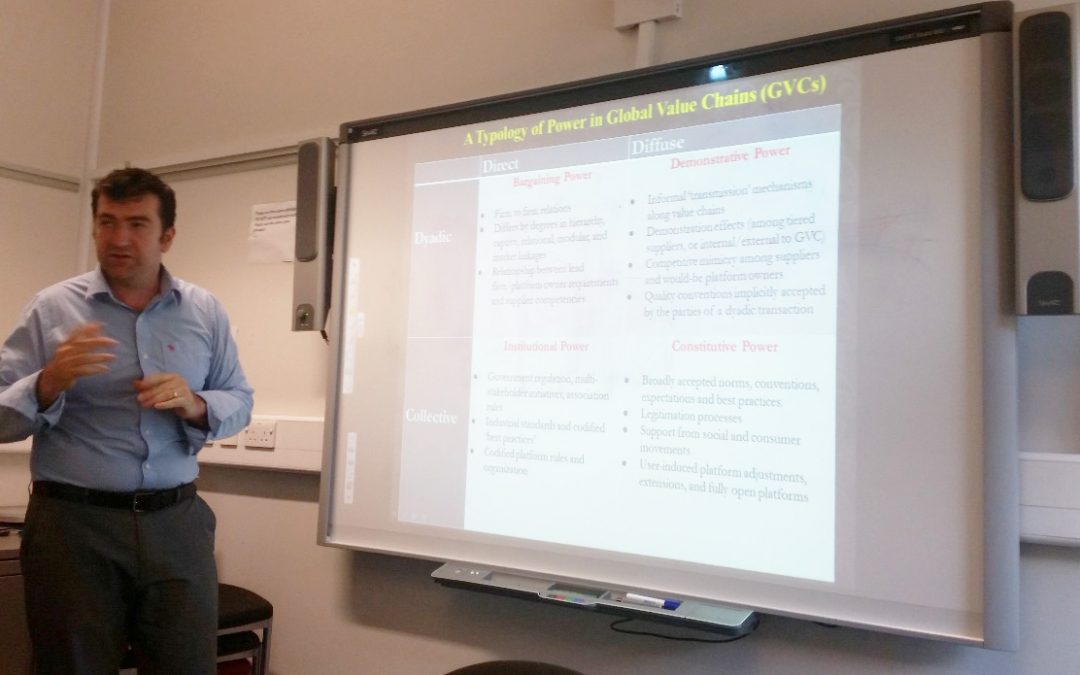Aarti Krishnan, Global Development Institute and the Overseas Development Institute
Governance and power form the core of value chain analysis; however, these two concepts are multilayered, complex and fuzzy. Both truly tick ‘the more I read, the less I think I know’ box. As value chain and production network scholars, we often use these terms, but in many ways, hope that someone else opens the ‘blackbox’ first. On demand from PhD students, the Global Production Networks, Trade and Labour research group at the Global Development Institute and the Department of Geography, decided to bring in someone who has braved the challenge to systematise these concepts. Enter: Mark Dallas, Associate Professor of Political Science and Asian Studies at Union College, who delivered an insightful lecture and masterclass on his research.
Prof Dallas’s lecture started with a discussion on two of his recent papers, Cloth without a weaver: power, emergence and institutions across global value chains and A typology of power in global value chains. Both papers were revealing, as they highlighted and systematised understandings of how power can be conceptualised, measured and linked into governance in a value chain context. With significant implications for comprehending macro developmental outcomes, the importance of the ‘unit of analysis’ shone through clearly. In short, we must move beyond thinking of a firm as only exercising ‘agentic-strategic power’, or power used to control the actions of others. Sometimes firms make decisions that are originally unintended (a by-product of a firm’s action) but may create new forms of more stable structures, and so power can be self-organizing and thus, it is necessary to expand the boundaries of power to include such aspects, also known as emergent power. Together, both these agentic-strategic and emergent forms of power expand how we explain power in a value chain context. Unpacking these dimensions of power enable comprehending development outcomes holistically. This also threw up a critical epistemological question of not just what is the unit of analysis we use to understand global value chains but also what is the ‘point of entry’ into the chain and who is considered to be affected. This is especially important when considering polycentric structures within value chains.
Prof Dallas also discussed a typology of power in global value chains in closer detail. Along with Stefano Ponte and Tim Sturgeon, Prof Dallas has identified two principal dimensions of power: transmission mechanisms – direct and diffuse; and arena of actors – dyads and collectives. Combined, these two dimensions yield four ideal types of power exercised in GVCs: bargaining, demonstrative, institutional and constitutive. Using examples from wine to mobiles to garments, Prof Dallas and his coauthors illustrated the path dependent trajectories of the four types of power. For instance, in wine value chains, bargaining power (over product specifications like price and quality) is concentrated in the buyer’s hands, while demonstrative power (between dyads) has been wielded by élite wine producers. This paper is a huge leap in how we can systematically think about power.
Prof Dallas also delivered a masterclass around his work on ‘governed trade’ in global value chains, where he gave us an insight into how he created a database to measure governance. We tried to tackle the complicated world of big data, examining processes of data collection: cleaning, internal and external validation, and generalise-ability. The class felt especially pertinent in a world where the quantification of ‘value’ within value chains is increasingly crucial to effecting policy.
All in all, we had two wonderful days of thought-provoking discussions, soaking up insights and debating complex and challenging issues. Thank you, Dr. Mark Dallas, for taking on the governance-power challenge!

